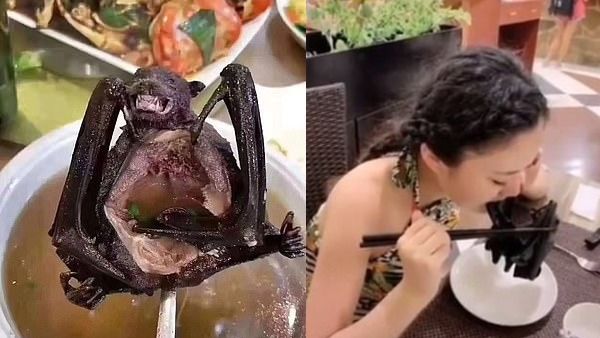A Chinese travel presenter has apologised to the public after a video of her eating a bat in 2016 went viral amid the coronavirus outbreak.
Wang Mengyun, who has gathered a massive following through her online travel show, is seen in the programme ripping apart the animal with her hands before eating it.
The three-year-old clip became widely shared on social media after the health crisis broke out in China, sparking an uproar from web users.
In a post last week, the globetrotter begged the public for forgiveness, calling herself 'ignorant'. She wrote: 'I am sorry, everyone. I should not have eaten a bat.'
The controversy occurred as the province of Hubei in central China is ravaged by the novel coronavirus after it first emerged in the city of Wuhan late last month.
The coronavirus has killed at least 106 people - all in China - and sickened more than 4,588 worldwide.
The intensifying outbreak has led the authorities to quarantine at least 56 million people living in central China's Hubei Province, including Wuhan, and cancel Lunar New Year festivities around the country.
The virus, which can cause pneumonia, is poorly understood. Scientists now fear it may have spread to humans from snakes or bats.
Ms Wang started producing her travel show, Dream Runner, five years ago.
The programme is released through various social media channels, including YouTube, Weibo and Douyin, gaining her millions of fans.
In 2018, Ms Wang, who was then 28, was selected as one of the 30 most successful Chinese entrepreneurs under the age of 30 by Forbes.
The episode that drew her widespread criticism was filmed in Palau, an island country located in the western Pacific Ocean, and broadcast in 2016, Ms Wang said.
She ate bat soup in order to introduce the local lifestyle to the audience and the soup was a 'common dish' for the locals, the presenter explained in an apology letter posted last Wednesday.
In the viral video, Ms Wang can be seen holding what she called a fruit bat in her hand.
She described of the soup: 'The soup we just had was very delicious and had a fruity flavour.'
She then held the bat closer to the camera and gushed: 'Doesn't it look like a mini wolfdog?'
Afterwards, she informed her audience that bats tasted like chickens and that their meat was very 'nutritious'.
At last, she started to tear the bat apart with her hands, dipped part of it in a sauce and then put it into her mouth.
'There are so many nutrients in it,' she said before eating the dish.
The video was dug up by Chinese web users and shared online after the nation was rocked by the coronavirus outbreak.
Many web users condemned Ms Wang for eating exotic animals.
One such person said: 'Even if it is a local specialty, how could you eat it? [You] dare to eat anything.'
Another Weibo user wrote: 'I cannot understand why she wanted to eat that.'
There were also supporters, such as one fan who argued: 'She is a travel blogger. This is her job. Whatever you don't recognise is not necessarily wrong.'
Faced with the outrage, Ms Wang published an apology letter on January 22 on her Weibo account, which is followed by 2.2 million people. However, the post has since been taken down for unspecified reasons.
In the letter, Ms Wang claimed to be a victim of online trolls following the outbreak because 'there was not so much footage of eating wildlife online'.
She said that the programme was recorded long before the emergence of the coronavirus and she was not aware of the risks of eating bats at the time.
'When I filmed the video, I honestly did not know there would be a virus. My ignorance is to blame.'
She added that the bat she ate was from a farm, not the wild, adding 'many countries in the world eat [bat soup], it is a daily dish'.
Ms Wang's video appeared online at the same time videos purporting to show Chinese diners eating bat soup went viral.
One clip appears to show a Chinese woman eating a whole bat at a fancy restaurant while another video seemly shows Cantonese-speaking diners preparing to eat soup made with the nocturnal animal.
MailOnline cannot independently verify the clips.
Bats are used in traditional Chinese medicine to treat a series of illnesses, including coughing, malaria and gonorrhea.
The animal's faeces is also believed to be able to cure eye diseases, according to ancient Chinese medical masterpiece Ben Cao Gang Mu.
The deadly Chinese coronavirus outbreak began at a wholesale animal market in Wuhan city, experts have confirmed.
Scientists from the Chinese Centre for Disease Control and Prevention said tests proved humans caught it from animals at the Huanan Seafood Wholesales Market.
It is not clear which animal was carrying the pneumonia-like illness but the market was home to stalls trading dozens of different species, including rats and wolf cubs.
This article has been adapted from its original source.








